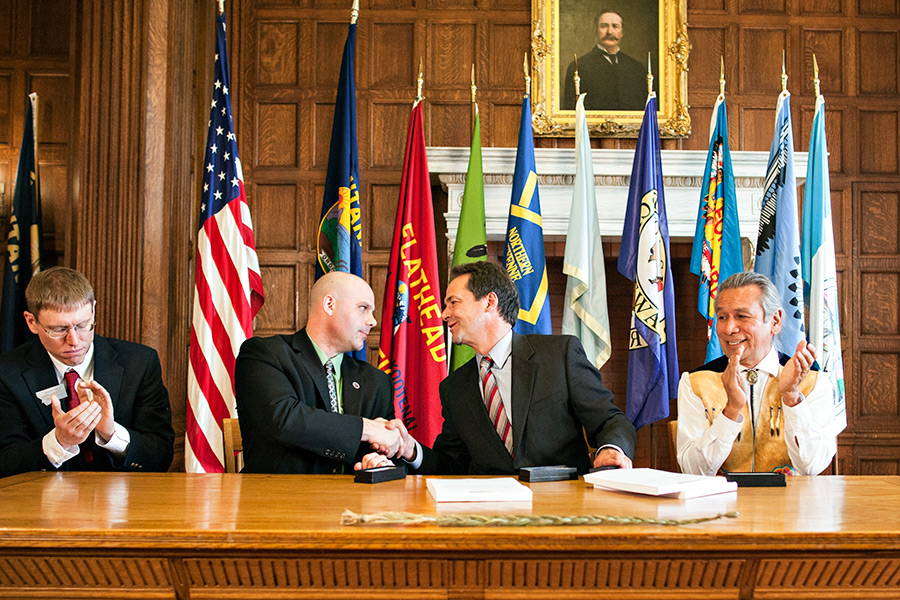Infrastructure
On April 27, lawmakers in the House voted down Senate Bill 416, the $150 million infrastructure bill, and voted to adjourn for the session.
The infrastructure bill was the final issue before the Legislature, which has already passed a two-year state budget.
Over the weekend, the Bullock administration and leading lawmakers were still trying to negotiate an over-arching state budget and infrastructure spending deal.
The sticking point was SB416, which provides at least $150 million in cash, bonding and borrowing authority to finance statewide public works projects and construction of new state buildings on college campuses and elsewhere.
While the state constitution requires the Legislature to pass a two-year budget each session, no such requirement exists on the building-project funds.
The Legislature’s scheduled 90th and final day was May 1, though it adjourned April 28.
Medicaid Expansion
The state Legislature passed a bill expanding Medicaid eligibility to about 45,000 low-income Montana residents.
The bill approved April 18 now heads to Gov. Steve Bullock, who is expected to sign it into law on April 29.
Republican Sen. Ed Buttrey of Great Falls brought the measure in March after the governor’s proposal to expand Medicaid failed. He calls it a compromise because it would require enrollees to pay premiums and copays for services.
Proponents say the bill will help Montana rural hospitals that are in danger of closing due to the overwhelming cost of uncompensated care.
Tribal Water Compact
One of the most prominent and significant topics of the session, the water compact with the Confederated Salish and Kootenai Tribes was passed into law after a series of divisive, heated debates.
Democratic Gov. Steve Bullock signed Senate Bill 262 into law on April 24, surrounded by about 150 supporters, including bill sponsor Sen. Chas Vincent, R-Libby, and Tribal Chairman Vernon Finley.
The historic measure, decades in the making, details a water use agreement among the CSKT and the state and federal governments.
Congress will take up the compact next. State attorneys say it could be years before the agreement is approved by Congress and moves to the tribes for implementation.
A former opponent of the compact, Vincent helped re-negotiate the deal after he and other lawmakers in the 2013 session shot down a compact that was seen as less friendly to non-tribal irrigators.
Dark Money
Gov. Bullock signed Senate Bill 289 into law April 22 at the Capitol, calling the Montana Disclose Act a major step in making Montana elections among the most transparent in the nation.
“Montana has now added the sunshine and the transparency to our election laws that the rest of the nation can look to, to make sure that elections are decided by the people that vote,” Bullock said.
Sponsored by Republican Sen. Duane Ankney of Colstrip, carried through a divided House by Rep. Frank Garner, R-Kalispell and backed by Bullock, the Montana Disclose Act will shed some light on anonymous money that began flowing into elections after the U.S. Supreme Court’s 2010 decision in Citizens United v. Federal Election Commission. The court held that it’s unconstitutional to ban corporations from making political expenditures if the money is not given directly to a candidate.
The new law will require groups that spend money on elections at the state level to disclose their donors, including those that have been previously exempt from the practice. Organizations have been able to skirt laws requiring political contribution disclosure if their purpose and federal tax designation categorizes the group as dedicated to education or advocacy.
Public Pre-School Programs
One of Bullock’s priorities this session was proposing a $37 million early childhood education program that would have made half-day, pre-kindergarten programs available to 4-year-olds.
The measure, dubbed Early Edge, was voted down in the House, but the Bullock administration remained hopeful at the session’s end that the over-arching state budget deal might include the proposal.
DUI Laws
DUI offenders soon could be paying more for their crimes. The Montana House and Senate voted overwhelmingly in favor of House Bill 488, which doubles maximum fines for repeat offenders, and closes loopholes in present law.
Sponsored by Rep. Keith Regier, R-Kalispell, it would require anyone who refuses to submit to a breath, blood or urine test to pay a $300 fine. That money would pay for the state to process blood-draw search warrants and to test blood.
